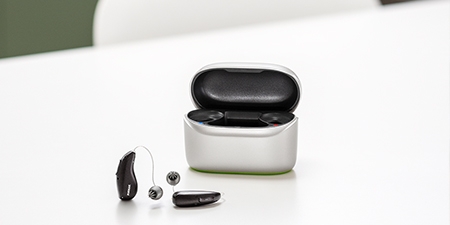Learn to Recognize the First Signs of Tinnitus

Learn to Recognize the First Signs of Tinnitus
5 min
Published July 2, 2024
Recognize the First Signs of Tinnitus
Tinnitus is a condition characterized by the perception of noise or ringing in the ears. It affects millions of people worldwide and can significantly impact quality of life. Early recognition of tinnitus is crucial for managing and potentially reducing its symptoms. Even though there is no cure, seeking treatment at a hearing clinic will offer techniques to manage the condition through hearing aids and noise-masking devices.
Understanding Tinnitus
Tinnitus is not a disease, but a symptom of an underlying condition, such as hearing loss, ear injury, or a circulatory system disorder. It can manifest in various forms, including ringing, humming, buzzing, or hissing sounds in the ears.
Types of Tinnitus
Having an audiologist determine which type you have helps identify the underlying cause and the most effective tinnitus treatment for your condition. There are two different types:
Subjective Tinnitus - This is the most common form of tinnitus. Only the person experiencing it can hear the noises, typically caused by damage to the outer, middle, or inner ear. Common contributors include prolonged exposure to loud noises, age-related hearing loss, and ear infections.
Objective Tinnitus - Objective tinnitus is less common, and the noises the patient hears can also be heard by a doctor during an examination. This form can result from vascular issues, middle ear bone conditions, or muscle contractions. Objective tinnitus often has a more identifiable physical cause than subjective tinnitus.
Early Signs of Tinnitus
These are common signs of tinnitus. They can vary from person to person, and while one may have a single symptom, another person could have multiple. If you notice any of these, it's important to schedule a hearing test at a hearing or tinnitus clinic.
Ringing in the Ears
One of the most common early signs of tinnitus is a persistent ringing in one or both ears. This ringing can vary in pitch and intensity and may come and go or be constant.
Constant Humming or Buzzing
Hearing a continuous humming or buzzing sound without an external source is another early indication of tinnitus. This noise can be particularly noticeable in quiet environments.
Hissing Sounds
Some people with tinnitus report a hissing noise, similar to the sound of steam escaping. This sound can also fluctuate in volume and pitch.
Loud Thumping
Experiencing loud thumping noises in one or both ears, especially in sync with your pulse, can signify tinnitus.
Musical Hallucinations
In rare cases, individuals may hear musical tunes or melodies that aren't actually playing. This phenomenon is known as musical hallucinations and can be an early symptom of tinnitus.
Obvious Hearing Loss
Tinnitus often accompanies hearing loss. If you notice difficulty in hearing conversations or increased sensitivity to loud sounds, your hearing loss might be related to tinnitus.
Prevention and Management Tips
While tinnitus can be challenging to treat once it develops, there are several steps you can take to prevent it or manage its symptoms:
Protect Your Hearing - Use earplugs in loud environments, such as concerts, construction sites, or when operating loud machinery. Protecting your ears from excessive noise exposure is crucial in preventing tinnitus.
Keep the Volume Low - When listening to music or using headphones, keep the volume at a safe level. Prolonged exposure to high volumes can damage your hearing and contribute to tinnitus.
Manage Stress Levels - Stress can exacerbate tinnitus symptoms. Practice relaxation techniques such as meditation, deep breathing exercises, or yoga to reduce stress levels.
Maintain a Healthy Lifestyle - Regular exercise and a balanced diet can improve overall well-being and reduce the risk of tinnitus. A healthy lifestyle supports your auditory system and reduces the chances of developing tinnitus-related conditions.
Monitor Blood Pressure - High blood pressure can contribute to tinnitus. Regularly monitor your blood pressure and seek treatment if it’s elevated. Managing your blood pressure can help prevent tinnitus from worsening.
Take Action at the First Signs of Hearing Loss & Tinnitus
Tinnitus can be a distressing condition, but recognizing the early signs and taking preventive measures can make a significant difference in how it affects your daily life. If you experience any symptoms of tinnitus, visit an AudioNova tinnitus clinic for a comprehensive evaluation and personalized management plan. Protecting your hearing and maintaining a healthy lifestyle can reduce the risk of developing tinnitus and improve your quality of life.




